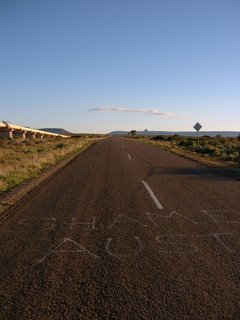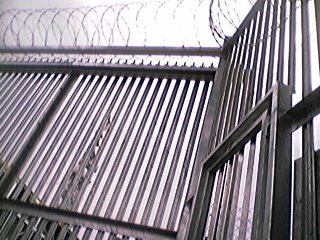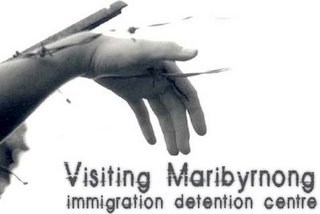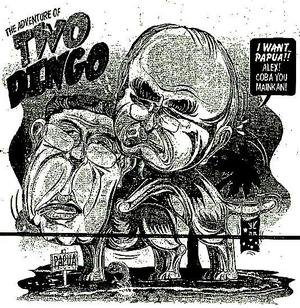
The Newly Proposed Refugee Laws: A Continuation of John Howard’s Pacific Solution**
Jessie Taylor
By now, you may have heard of the reforms to the Refugee Law that were announced the week before Easter.
These changes have come as a surprise to many refugee advocates and lawyers, as recently the Government had been softening its line on asylum seekers, acknowledging that most boatpeople (around 93%) who apply for refugee status in Australia are eventually accepted as legitimate refugees.
Arriving in Australia without documents, in a boat, uninvited, is not illegal under International or Australian domestic law. In fact, this exact situation is provided for in the Universal Declaration of Human Rights, the UN Refugees Convention, and in section 36 of Australia’s own Migration Act. But since 1992, the Australian policy has been to detain such people mandatorily and indefinitely – until they are granted a visa or removed. The nature of Australia’s refugee determination process is such, however, that thousands of people (including many hundreds of children) have been jailed for years while their applications are processed, and mostly eventually found to be legitimate.
Recently, particularly following the Cornelia Rau episode and Petro Georgiou’s proposed Private Members Bill in 2005, the Howard Government has been softening its line. It admitted that it was not morally sustainable to detain children, and it rolled back the ‘Pacific Solution’. This does not constitute a relaxing of Australia’s border protection policy, as all entrants into Australia still undergo rigorous identity, health, security and ‘public interest’ checks. ASIO has also stated on a number of occasions that never in history has an asylum seeker posed a security risk to Australia.
I had believed - hoped beyond all hope - that all of this indicated that the Government’s very harsh treatment of refugees was sort of coming to an end, but now suddenly the Government has regressed by about 5 years, straight back into the Tampa days - from the 'change of culture' and 'softer approach to asylum seekers' straight back into the Pacific Solution of 2001 - the 'sending a strong message to people smugglers' and other extremely harsh ideas that resulted in the 2001 Howard election victory.
There are some very serious consequences to the policy changes that have been announced. This is the most drastic amendment to the Migration Law since the introduction of the mandatory detention provisions in 1992. I will outline a few of the changes and their consequences here...
ASYLUM SEEKERS WILL BE PROCESSED OFFSHORE
Asylum seekers will not be able to wait in mainland detention centres while their claims are processed. They will be sent to Christmas Island, Manus Island, and the tiny, bankrupt heap of an island - Nauru. It will be here - out of sight and out of reach of the media, lawyers and the Australian public - that their cases will be determined. The Pacific Solution is economically unjustifiable. It currently costs the government $1.8 million annually to maintain Manus Island with no detainees. The transportation of 43 West Papuan asylum seekers to Christmas Island in January cost more than $700,000. (These figures do not include the more than $1 billion dollars already spent on detention, transportation and deportation). It costs over $1 million per month to keep two young Iraqi men (both assessed as refugees by Australia AND the United Nations High Commissioner for Refugees) detained on Nauru. Last week I received an email from one of them, which stated the following: “Every thing is terrible here and the situation is becoming more unbearable day after day or let me say hour after hour. I hope you had nice dreams last night. As for me, I'm only having nightmares and no matter while I'm asleep or awake… it's all the same”
The Pacific Solution is very, very costly, both in financial terms, and in human terms.
AUSTRALIA WILL NOT BE ACCEPTING ANY ‘BOATPEOPLE’ AS REFUGEES
By deciding only to take asylum seekers as a very, very last resort, Australia has reneged from its obligations and responsibilities under International Law. It has crossed a line that indicates a disregard for principles of international burden sharing and responsibility for some of the world's most needy individuals. This policy breaches the Universal Declaration of Human Rights, the Convention on the Rights of the Child, the Convention Against all forms of Racial Discrimination, the Refugees Convention, the Convention Against Torture, and a few others. This is not something we should be proud of. Remember that all of these Conventions were drafted as a reaction to the horror of the Holocaust, and the conviction of the international community that it is our global responsibility never to let such a thing happen again. By making these changes Australia is indicating that we don’t see that as being much of a priority anymore, and opening the door for other countries to disregard those documents too. This is very dangerous territory
CHILDREN WILL BE DETAINED AGAIN- MANDATORILY & INDEFINITELY
The long-lasting and horrific impacts of immigration detention on children are very well documented. In Australia, the only documented incidents of pre-adolescent suicide attempts are in Immigration Detention. And there have been many. Previously-healthy children as young as 5 have deeply cut themselves, starved themselves, hanged themselves with bed sheets and drunk cleaning fluids to try and end their own lives in detention. The Human Rights and Equal Opportunity Commission Report of the National Inquiry into Children in Immigration states that “children in immigration detention for long periods of time are at high risk of serious mental harm. The Commonwealth' s failure to implement the repeated recommendations by mental health professionals that certain children be removed from the detention environment with their parents amounted to cruel, inhumane and degrading treatment of those children in detention”. But in order to send its 'strong message', the government has decided that the suffering and permanent damage of children is a legitimate means to achieving a policy objective. This is obviously unacceptable, and must not be allowed to creep back into Australian law.
FOREIGN POLICY CONSIDERATIONS WILL NOW TRUMP AUSTRALIA'S OBLIGATIONS TO REFUGEES
By asking countries of origin to comment on the legitimacy of refugee claims, a number of unsatisfactory things are occurring:
- Australia is pandering to its own domestic interests - a factor which is never supposed to come into consideration in the refugee determination process. International Human Rights Law is supposed to transcend nationalistic foreign affairs issues and objectives.
- The recent suggestion that the Indonesian military be allowed to assess the refugee claims of West Papuan applicants is quite absurd. It's like asking Saddam Hussein's regime to review Iraqi asylum claims. Or the Taliban to look at Afghan Hazara claims. Or the Nazis to look at 1940s Jewish claims. Or the Dark Lord Sauron to assess Frodo Baggins’ claim. We are looking at a Government that clearly has very little concept of what the realities of persecution look like. This is an idea which is either shortsighted, or willfully cruel.
- We are making a mockery of ourselves on the world stage. The International community has not looked at Australia with such contempt and incredulity since we threatened to seize the MV Tampa and its cargo, and charge its Norwegian captain Arne Rinnan with the crime of people smuggling! This posturing caused a major international incident, which was diffused only by the extremely generous attitude of the Norwegian government. Australian-Norwegian relations are only just recovering. We are not doing ourselves any favours by turning away from widely recognised international standards of Human Rights.
THE AUSTRALIAN MAINLAND IS BEING EXCISED FROM THE ‘MIGRATION ZONE’
During the Pacific Solution, Australia took the extraordinary step of ‘excising’ thousands of Australia’s islands from the ‘migration zone’. This set up an extraordinary distinction between Australia’s sovereign territory, and its migration zone. This meant that anyone arriving on those islands was not arriving in Australia’s ‘migration zone’, therefore had no rights in Australian law, and no recourse to the Australian legal system. This idea was slammed from many angles, not least of all because it was enacted retroactively – that is, it stripped the rights of people who had landed on the islands even before the law was passed.
Under the proposed changes, the entirety of Australia will be excised from the Australian ‘migration zone’. People arriving in Australia will not be able to avail themselves of Australia’s protection, which it promised by signing and ratifying the UN Refugees Convention. It is not difficult to see why this is highly problematic and unfair.
In summary, this stuff is huge. We are backing away from our obligations under International Law. Re-activating a policy that has been slammed by the International community, the United Nations, welfare groups, human rights groups, psychiatrists and other nations. Adjusting things so that children can be detained again. We will be shopping around trying to make other countries take refugees who have landed on our soil. And it will happen - remember that the Howard Government has control of both houses of the Parliament, and Parliament is due to debate this bill in the first week of May. If you voted for John Howard at the last election, you should write to him and TELL him that, and then tell him that this proposed change is untenable. Let him have it. Even if only for the fact that there is no way that it is acceptable to lock up innocent, already traumatised children on a desert island indefinitely.
Imagine if every country behaved in the way Australia is behaving at the moment. There would be literally nowhere in the entire world where it would be possible for refugees to go and finally find some peace, safety and security.
DON’T GET MAD, GET ACTIVE!
If after reading all of this you feel like having a tantrum and throwing something, here is what you can do instead. On the next page you will find some points you can use to write letters to some politicians.
We need a dozen Liberal and National MP's in Parliament to become confident enough to Cross the Floor and block this legislation; and we need two Senators to Cross the Floor and block the passage of this Bill.
I know a lot of you will be nervous about doing this because you feel like you don’t know the issue well enough and you don’t know fancy-pants language to express yourself in. But some of the BEST letters I’ve ever seen are written by people who are just unhappy with what they are seeing happen. They’re not lawyers, they’re not politicians, they’re just Australian citizens who hate injustice. So get into it!
And tell all your friends to do the same! If we sit back and take no action on this reversion to the Pacific Solution Episode II, before long we will be kicking ourselves. Hard.
**The Pacific Solution was the name given to the Australian government policy of diverting asylum seekers to detention camps on small island nations in the Pacific Ocean, rather than allowing them to land on the Australian mainland. There were a number of pieces of legislation supporting this policy, including the controversial excising of thousands of islands from Australia’s migration zone or Australian territory.
Asylum seekers were intercepted at sea while sailing from Indonesia and moved using Australian naval vessels. Detention camps were set up on Christmas Island, Manus Island in Papua New Guinea, and on the tiny island nation of Nauru.
All costs associated with running the centres and processing the asylum applications were met by Australia.
Criticism of the Pacific Solution: The policy received criticism from a number of areas, with Amnesty International, refugee rights groups and other NGOs claiming that Australia was failing to meet its international obligations. The ad-hoc nature in which the policy evolved was also criticised, as it resulted in people being moved to Manus Island and Nauru before facilities were ready.
As of May 29, 2005, 1,229 asylum seekers had been processed on Nauru. Most of those detained were eventually found to be legitimate refugees, sometimes after more than three years in detention. As of October 15, 2005 all but two remaining asylum seekers had been transferred to mainland Australia with the majority of these entering the community with temporary protection visas. As of April 23, 2006, the centre continues to hold just two inmates, at an estimated $1 million AUD per month. (Thanks Wikipedia.org!)





